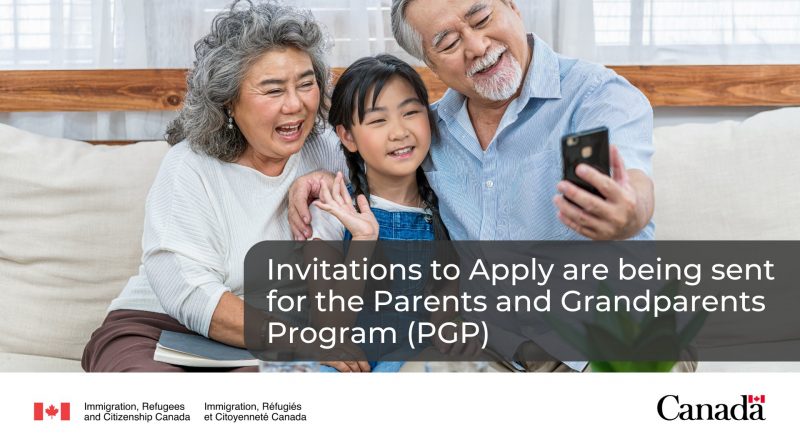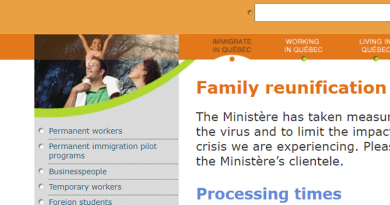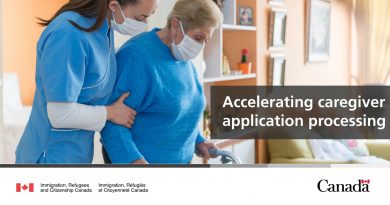How to Sponsor Your Parents and Grandparents
Updated in 2023/05 in IRCC
About the process
If you submitted the interest to sponsor form in 2020 and were invited to apply to the 2022 intake, you were able to sponsor your parents and grandparents to become permanent residents of Canada.
Between October 12 and 20, 2022, we invited potential sponsors to apply. The deadline to apply has now passed.
We aren’t accepting any more applications for the 2022 process.
If you were invited to apply, there were 2 applications that must have been submitted for the parents and grandparents program:
- the sponsorship application and
- the permanent residence application
If both applications are approved, you’ll sign an agreement called an undertaking that starts on the day the person you’re sponsoring (and their family members, if this applies) becomes a permanent resident of Canada. This agreement is discussed under Who is eligible to sponsor a parent or grandparent.
Fees
Sponsor a parent or grandparent: from $1,080Processing time
25 monthsThe persons you sponsor may need to give biometrics after they apply. This processing time includes the time they need to give their biometrics.
Information on the PGP 2023 is not yet released. Please contact us (Whatsapp & Wechat) for more details on PGP 2023 developments in the future.
The PGP 2022 application intake has finished in 2022. IRCC has invited 23,100 potential sponsors to apply to sponsor their parents and grandparents; with the goal of receiving 15,000 complete applications..
Who is eligible to sponsor a parent or grandparent
Find out if you meet the income requirements
Before you apply, find out how much money you need to sponsor your parents and grandparents. You’ll have to prove you have this income in your application.
You, the sponsor (and your co-signer, if you have one) must prove you have enough income to support all the people you’ll be financially responsible for once you become a sponsor. This includes yourself.
If you’re invited to apply, you have to provide proof that you meet the income requirements for each of the 3 tax years before the date you apply.
We can’t assess whether you meet the income requirements until you apply (if you’re invited).
Note: For the 2022 process, we’ll assess sponsors on their income for tax years 2021, 2020 and 2019.
This table applies to you if you live in any province or territory except Quebec. If you live in Quebec, the Quebec ministry in charge of immigration will assess your income.
| Total number of people you’ll be responsible for | 2021Footnote 1 | 2020Footnote 1 | 2019Footnote 1 |
|---|---|---|---|
| 2 people | $32,898 | $32,270 | $41,007 |
| 3 people | $40,444 | $39,672 | $50,414 |
| 4 people | $49,106 | $48,167 | $61,209 |
| 5 people | $55,694 | $54,630 | $69,423 |
| 6 people | $62,814 | $61,613 | $78,296 |
| 7 people | $69,934 | $68,598 | $87,172 |
| If more than 7 people, for each additional person, add: | $7,120 | $6,985 | $8,876 |
Since many sponsors may have been affected financially by the COVID-19 pandemic, the income requirement for the 2020 and 2021 tax years have been reduced to the minimum necessary income, instead of the minimum necessary income plus 30%.
NOTE: the average increase rate of LICO is roughly 3% each year. In regular times, the minimum fund of sponsoring parents and grandparents is LICO * 130%, the LICO figure is gross income annually.
In Canada, gross income generally includes all income earned from employment, self-employment, investments, and other sources, before any deductions such as income tax, Canada Pension Plan (CPP) contributions, and Employment Insurance (EI) premiums. So, CPP and EI contributions are typically included in gross income.
Also, family class sponsors will be able to count these benefits in their income calculations for the 2020 and 2021 tax years:
- regular Employment Insurance benefits (rather than just special Employment Insurance benefits)
- any Canada Emergency Response Benefits issued under the
- Employment Insurance Act or
- Canadian Emergency Response Benefit Act
- other temporary COVID-19 related benefits
- as long as they’re not part of provincial social assistance programs
Note: This does not affect the income requirements for the 2019 tax year.
Combined proof of income between the sponsor and co-signer (for example the sponsor submits 2 years of notices of assessment and the co-signer submits 3 years) does not meet the requirements under the Immigration and Refugee Protection Regulations. Both the sponsor and co-signer (if there is one) must submit 3 notices of assessment, or equivalent documents, issued by the Minister of National Revenue. The assessments must be for the 3 taxation years immediately before the sponsorship application date.
Footnote 1
To prove you meet the income requirements, you must include your Notice of Assessment from the Canada Revenue Agency (CRA) for the last 3 tax years before you apply (2021, 2020 and 2019). The easiest way to prove your income is to give us permission to get your Notices of Assessment directly from the CRA.





